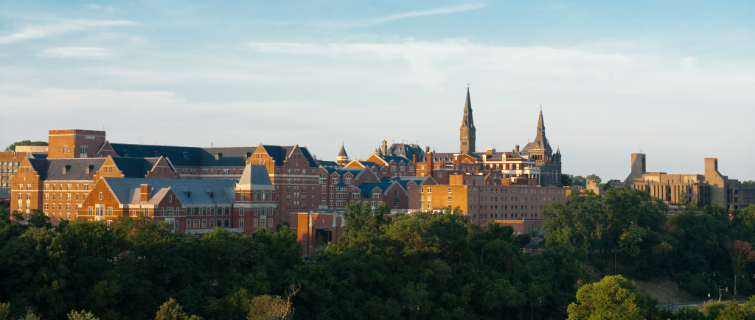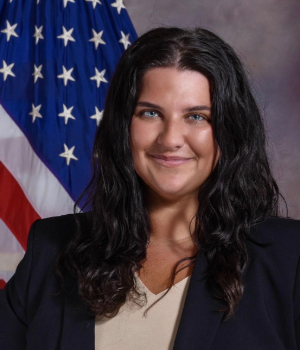
She didn’t exactly call him a taskmaster—not that at all. But Elise Annett (G’22) said she came to appreciate that David Parkyn, Ph.D., a retired university president and now an instructor in the Master’s in Higher Education Administration program at Georgetown University, set very high standards for her as her closest mentor in the program.
Told of this at his home near Philadelphia, Dr. Parkyn, who cherishes his role guiding young people in their careers, seemed a little perplexed—and amused.
“I didn’t realize that,” Parkyn said. “I’m happy that she said that. I wouldn’t want it the other way.”
There is a simple explanation for these differing perspectives, and if you were to talk to Annett or other high-achieving graduates from any of Georgetown’s 18 Master of Professional Studies programs, you would understand. Instructors like Parkyn set high standards, of course. But, more importantly, they serve as role models, urging students to explore the myriad opportunities for intellectual, personal, and career growth that rigorous professional study can provide.
The real standards-setting comes from within.
“She’s always thinking about what’s around the curve, just ahead,” Parkyn said of Annett. “She knows that there’s change all around us and that it can be challenging, but she has the propensity to say, ‘Let’s get our arms around it and embrace it.’”
A Field in Transition

When Annett began the higher education administration program in Fall 2021, she was a recent graduate of Catholic University and worked as a resident education program manager in Georgetown University’s Office of Residential Living. Shortly after graduating in December 2022, she worked as an evaluation and measurement unit operations manager at the U.S. Department of State’s School of Language Studies. In April 2024, she became an institutional research, assessment, and accreditation associate at the Eisenhower School for National Security and Resource Strategy.
The ability, as Parkyn put it, to “think about what’s around the curve” is an important quality for a career in higher education, which is under increasing pressure to adapt to the needs of a knowledge-based economy. Just what has to change and how fast this needs to occur is subject to considerable debate, say Arthur Levine and Scott Van Pelt in their book “The Great Upheaval: Higher Education’s Past, Present and Uncertain Future.” But they say that the “industrial” model of postsecondary education, inherited from the 19th and 20th centuries, is unsustainable.
In her work in the Higher Education Administration program, Annett took on these kinds of difficult issues. For example, for her capstone project, she researched how medical schools adapted medical education to the disruptions caused by COVID-19. In her job at the National Defense University, which offers an intensive nine-month program to a select group of military officers and civilians, she leads a team of institutional researchers who assess student, faculty, and program performance.
The Eisenhower School “educates joint warfighters and other national security leaders for strategic leadership and success in analyzing national security strategy,” Annett said. “We also evaluate, marshal, and manage resources to execute that strategy.”
Embracing the Unknown
Annett is currently pursuing a Doctor of Liberal Studies degree at Georgetown and has selected for her thesis a subject that highlights her penchant for tackling difficult problems. If that topic—military preparedness and ethics in the age of artificial intelligence—has all the qualities of a moving target, well, that’s why she likes it.
“I feel like the research changes almost every time I open up my laptop,” she said.
Annett can credit her own initiative for taking on this kind of hard work. But she also points to the Higher Education Administration program—and the people in that program—who urged her to challenge herself and not take the “safe” route.
“I think Georgetown is more than an institution,” Annett said. “I think it redefines people. I think it tests people. I think it strengthens people.”
“It demands excellence but also growth. You have to experience both to be a student at Georgetown. And one thing that I took away from the program was that I was able to embrace this complexity but also sit in this discomfort of uncertainty. The Higher Education Administration program forced me to push beyond my limits and never settle for that easy answer: to be familiar with the unknown."
